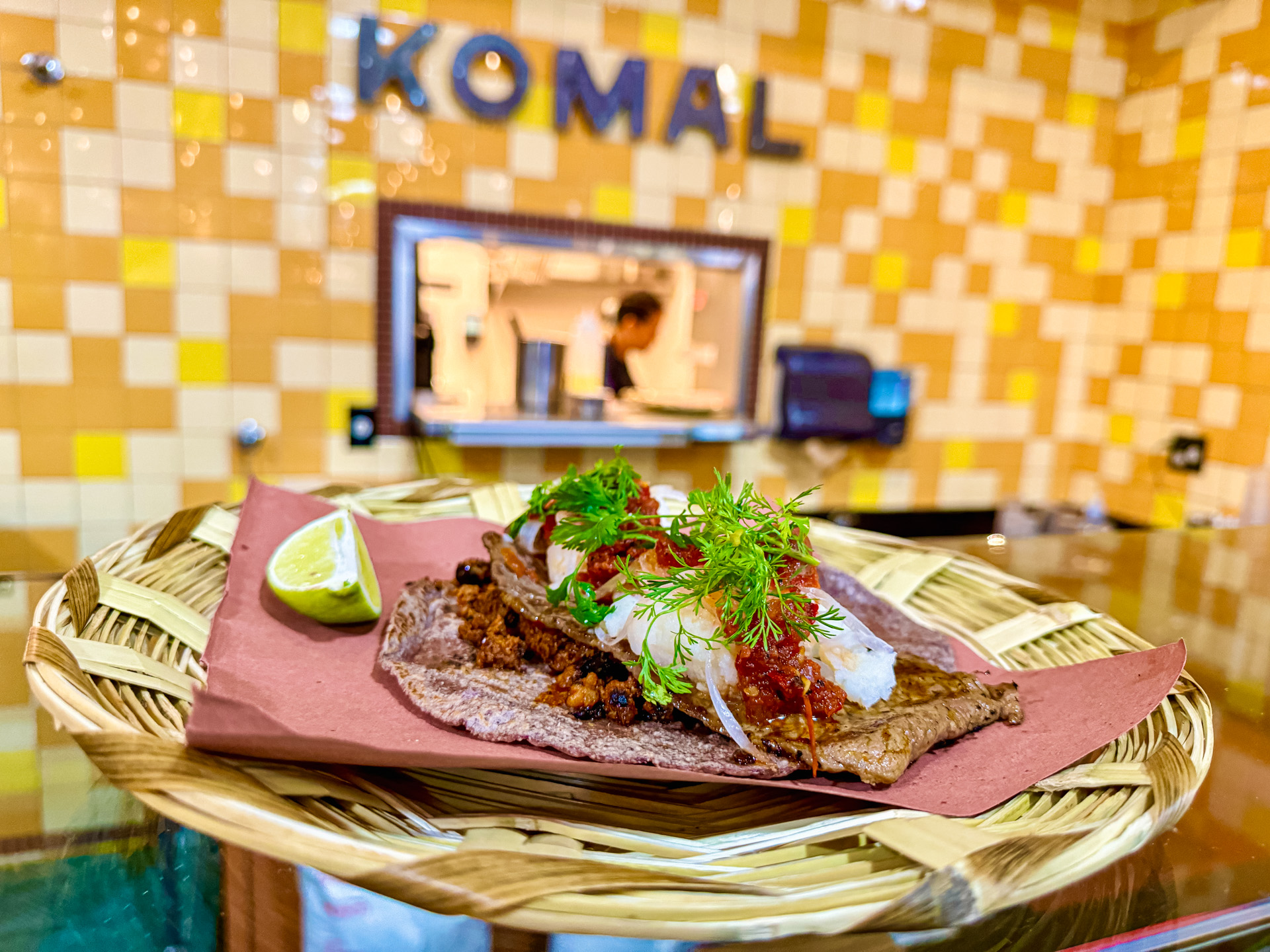Why did it take so long for L.A., the undisputed best taco city in these United States, to get its own craft molino (mill)? One that nixtamalizes nothing but ethically sourced, heirloom corn from Mexico? Even Bushwick, Brooklyn, got a great one of its own in 2022.
Fátima Júarez, the chef and proud Chilanga behind Molino Komal, which opens today at Mercado La Paloma in the Historic South Central neighborhood, suspects it has to do with how difficult it is to open a permitted restaurant in Los Angeles, especially when you are an immigrant.
“My husband, Conrado [Rivera], and I tiled every single tile by hand,” Júarez tells L.A. TACO, while she prepares for the debut of her tortillería and antojitos shop that has been years in the making. “Gilberto [Cetina], of Holbox next door, donated the hood for our kitchen—it truly has been a community effort to open Komal. It’s been a real chinga.”
Bolstering the chinga part is the fact that Júarez is opening Komal Molino three months after having her first child, a daughter.
“This stall represents our patrimony,” Júarez says.
The couple saved the money they both had made from working in restaurants over the past eight years, beginning when they immigrated from Mexico City to L.A. to make their dream come true.
“We reinvested everything we’ve ever earned since moving here into this shop, from paying our staff who come in every morning at 4 AM to nixtamalize to the specialty corn we are using,” she says.
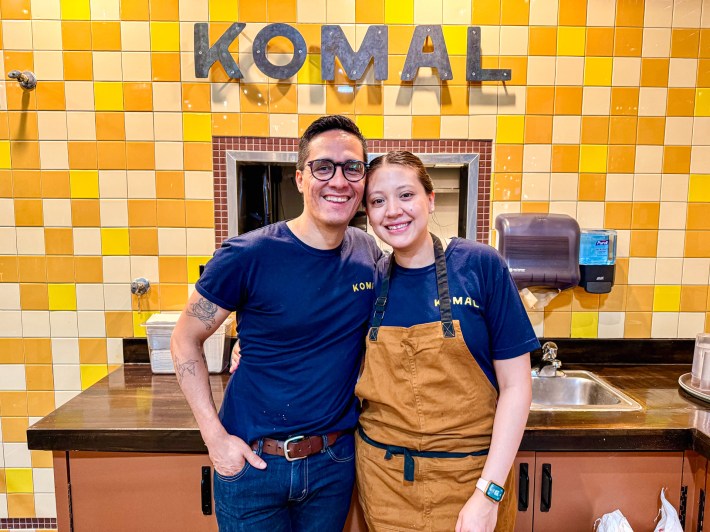
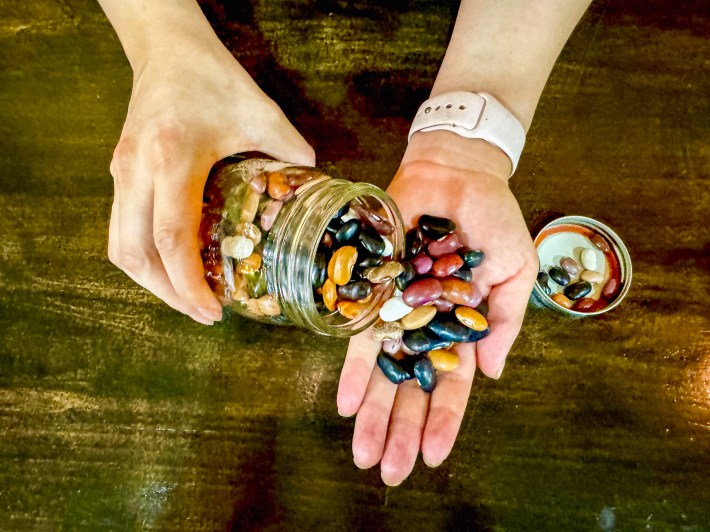
Another reason why it took so long for Los Angeles to get its first craft molino, despite having the world’s second largest population of Mexican residents after Mexico City, has to do with a tendency for immigrants to open tortillerías with commodity—aka cheap—corn over the last century.
“Corn tortillas have been devalued for so long in the U.S. A lot of people think masa should be cheap but it’s time to change that and add a value to all the honest farm work that goes behind your tortillas,” Júarez says.
However, with L.A.’s steady embrace of the $5 taco, it was only a matter of time until an ambitious, one-stop masa shop like Komal came into being.
The first craft molino can be attributed to Enrique Olvera’s Molino “El Pujol” in Mexico City. It opened in 2018 and was the first single-origin tortillería of its kind, offering a small, masa-based, and mostly vegetarian menu along with masa-made beverages.
Júarez worked in the kitchen at Olvera’s Damian in Downtown L.A., while Rivera worked front-of-house at Holbox for many years. At Molino Komal, they are combining their skill sets, sharpened over years of working in what are arguably L.A.’s best modern Mexican restaurants.
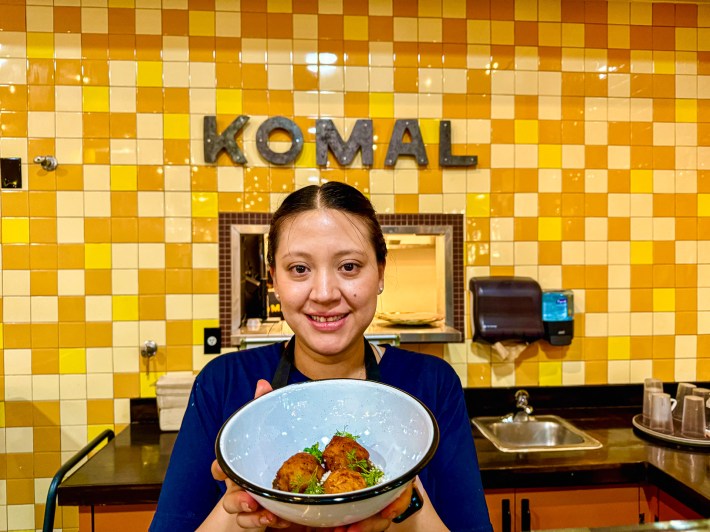
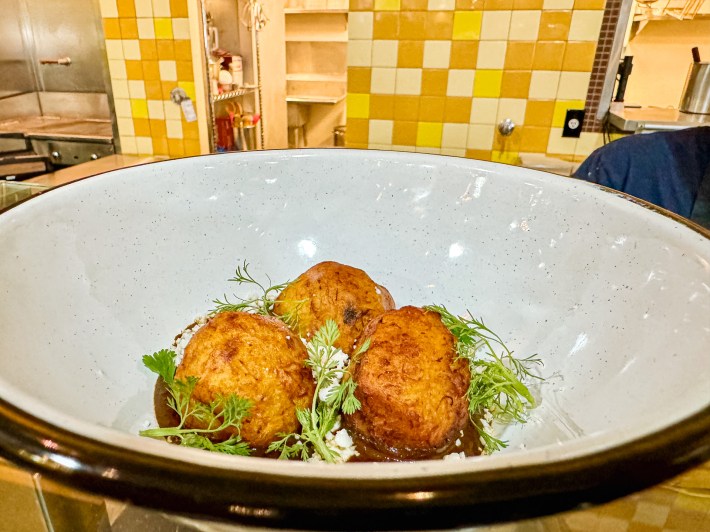
Molino Komal’s opening menu will feature three varieties of native corn: White Chalqueño Cremoso and Rojo (Red) Conico grown in the State of Mexico, as well as an Azul Bolita variety grown in Oaxaca. Júarez is intentionally sourcing all of its corn and beans from Tamoa, a Certified-B Corporation that prides itself in transparency and accountability, only buying surplus corn from Mexico’s Indigenous communities.
“We only buy from Tamoa because it’s important to me that the money we make here goes directly back to Mexico, including the company itself being based in Mexico and not the U.S.,” Júarez says.
Júarez also likes the brand’s commitment to buying machinery for the farmers to make the cleaning easier. Tamoa is the only heirloom corn exporter to the U.S. to have passed the rigorous review process for social and environmental performance and all of its legal requirements required to obtain B Corp Certification.
Júarez’s opening menu will feature eight antojitos, which are mostly masa-based—and all priced under $10 an item.
The menu includes a “Taco Sonia,” an ode to Júarez’s mother and the filling, working-class tacos that Júarez ate weekly growing up in Mexico City. It features a six-inch handmade tortilla with a seared slice of lean beef shoulder, crispy crumbled pork longaniza made by hand, and a generous amount of fluffy mashed potato. It’s a simple oversized taco that satisfies even the biggest appetites with just one or two tacos.
Despite countless taco stands serving Los Angeles on any given night, Molino Komal is the first in L.A. to offer the option of a scoop of mashed potato on top of your beef and pork taco.
You’ll also find tlacoyos filled with four kinds of heirloom beans sourced from Tamoa, representing another hard-to-find, Chilango-style street food antojito in L.A. Another rare dish that Júarez will offer is molotes de plátano, a tribute to her half-Oaxacan roots. It’s a fritter made from mashed, ripe plantain “masa,” stuffed with quesillo on a bed of silky mole that Júarez makes from scratch.
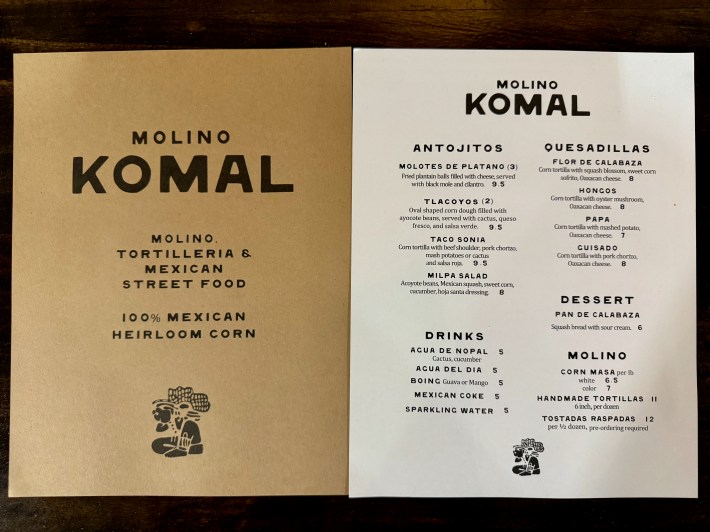
In addition to the food menu, Molino Komal will also sell masa by the pound, including a striped masa made with all three nixtamalized corn varieties, tortillas by the dozen, and tostadas raspadas (made by scraping the paper-thin top layer of a tortilla).
Beverages will include a refreshing agua de nopal made from blended cactus and cucumber. Juarez also makes pumpkin bread for dessert, using a Mexican heirloom variety of the gourd.
For the last year, Júarez has provided masa for the tortillas and tostadas at Holbox, which just became the first Mexican mariscos shop in the country to be awarded a Michelin star. She has also supplied the masa for Carlos Gaytan’s three Mexican restaurants at Downtown Disney since May of this year.
“It’s come full circle for me because my mom used to have a restaurant in Mexico City named 'Lazdao,' which means 'love' in Zapoteco, Júarez says. "And now I have my restaurant where I live now. Everything is for the love of masa.”
Molino Komal ~ 3655 S, Grand Ave, Los Angeles, California 90007
Opening today at 11 AM. Hours: Wednesdays to Sundays from 11 AM to 4 PM to start.
